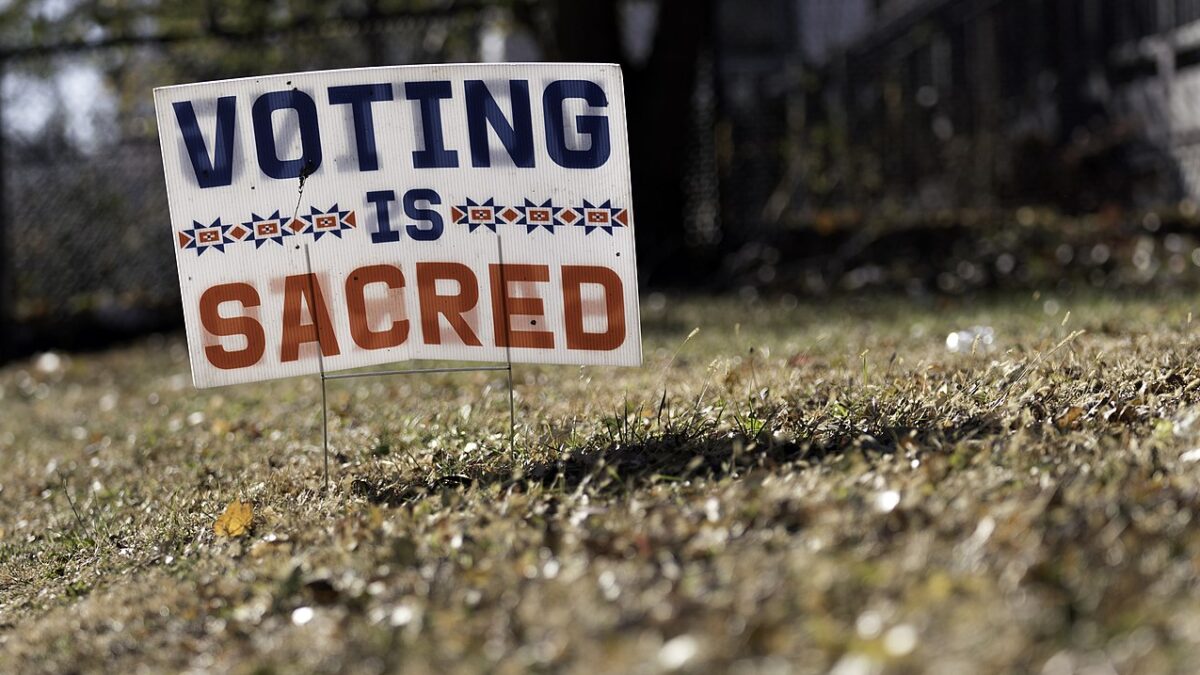‘The Biden-Harris administration is engaging in obstruction and outright abuse of power to prevent us from removing noncitizens from our voter rolls,’ Ohio Secretary of State LaRose said.
American elections should be decided by Americans — which is why states across the country have taken steps to remove noncitizens from their voter rolls. But the Biden-Harris administration is stymieing these efforts with roadblocks and lawfare.
Ohio
Ohio Secretary of State Frank LaRose sued the Biden-Harris administration on Thursday alleging the Department of Homeland Security refused to provide the state with “additional records” that are “essential to verifying the citizenship status of all Ohio voters,” as noted in a press release from the secretary of state regarding the lawsuit.
“The Biden-Harris administration is engaging in obstruction and outright abuse of power to prevent us from removing noncitizens from our voter rolls,” LaRose said in a statement. “I take my duty seriously, so if they want a fight over the integrity of our elections, they’ve got it.”
The suit alleges the administration, “on at least four separate occasions, failed to provide Ohio access to federal citizenship verification records necessary to prevent noncitizens from voting,” according to the release.
“While the administration is blocking access to these records,” LaRose added, “the Department of Justice is suing or threatening to sue multiple states, including Ohio, who are trying to enforce their citizenship voting requirements.”
Florida
A similar suit was brought last week by Florida and the Florida Department of State (FDOS) against the Department of Homeland Security (DHS). The suit alleged the DHS denied a request to provide information necessary to verify the citizenship status of “a number of individuals” on the voter rolls “for whom FDOS had evidence of non-citizenship.” The DHS is mandated to supply such information under federal law, the plaintiffs contend.
“Because the federal government is refusing to comply with these obligations and frustrating Florida’s ability to maintain the integrity of its elections, Florida files this suit,” the lawsuit says.
Texas
Texas Attorney General Ken Paxton announced Tuesday he is suing the Department of Homeland Security “and other members of the Biden-Harris Administration” for not complying with “federal law requiring them to assist States in verifying the citizenship status of potentially ineligible people registered to vote.”
The suit was filed weeks after Paxton sent a letter to DHS Citizenship and Immigration Services Director Ur M Jaddou “demanding” the federal government verify the “citizenship status of people who may be illegally registered to vote in Texas,” Paxton explained in a press release announcing the suit. Attached to the letter was a “list of approximately 450,000 voters whose citizenship status has never been checked because they registered without a State of Texas-issued driver’s license or identification card,” the release continued.
“The Biden-Harris Administration has refused to comply with federal law, presenting yet another obstacle for Texas to overcome in ensuring free and fair elections in our state,” Paxton said in a statement. “The law demands that they provide important information regarding the citizenship of nearly half a million potentially ineligible voters. Since the Biden-Harris Administration has chosen to ignore the law, I will see them in court.” --->READ MORE HERELaws permitting noncitizens to vote in the United States:
This article covers noncitizen voting in the United States. It includes background information about the issue, language from federal law and state constitutions, details about the municipalities that allow noncitizen voting, and a list of states where it is prohibited.
According to the Pew Research Center, there were over 25 million people living in the U.S. in 2020 who were not U.S. citizens. This included approximately 12 million permanent residents living in the U.S. with legal permission, as well as 2 million temporary residents visiting the U.S. for a period of time as students, tourists, foreign workers, foreign officials, etc. Pew's figure also includes approximately 11 million immigrants living in the U.S. illegally.[1][2]
In 1996, the U.S. Congress passed a law prohibiting noncitizens from voting in federal elections, including elections for the U.S. House, U.S. Senate, and presidential elections. This law does not apply to elections for state and local offices.[3] Click here to learn more about recent legal challenges involving noncitizen voting.
Background
According to political scientist Ron Hayduk of San Francisco State University, certain noncitizens were permitted to vote in federal, state, and local elections in 33 states between 1776 and 1924. He argued that granting the right to vote to noncitizens was a common incentive among U.S. territories and new states to attract workers and families to work and populate the lands.[4][5]
Hayduk also argued that immigration can lead to anti-immigrant sentiment and restricted voting rights:
“ Contrary to the dominant narrative about a consistent expansion of democracy and political participation in the United States, the history of immigrant suffrage provides a more accurate lens to expose a recurring pattern that runs throughout the history of American voting rights: one step forward and two steps back. An influx of newer immigrants at a point in time sparks a wave of nationalism and nativism—often associated with war or political conflict—and a rollback of voting rights.[4][6] ”
States began changing their constitutions to prevent noncitizen voting in the early Twentieth Century. Alabama (1901), Colorado (1902), Wisconsin (1908), Oregon (1914), Kansas (1918), Nebraska (1918), South Dakota (1918), Indiana (1921), Texas (1921), Mississippi (1924), Missouri (1924), and Arkansas (1926) all banned noncitizen voting within three decades. By 1931, noncitizen voting had become so rare that political scientist Leon Aylsworth noted, "For the first time in over a hundred years, a national election was held in 1928 in which no alien in any state had the right to cast a vote for a candidate for any office – national, state, or local."[4] --->READ MORE HERE
If you like what you see, please "Like" and/or Follow us on FACEBOOK here, GETTR here, and TWITTER here.



No comments:
Post a Comment